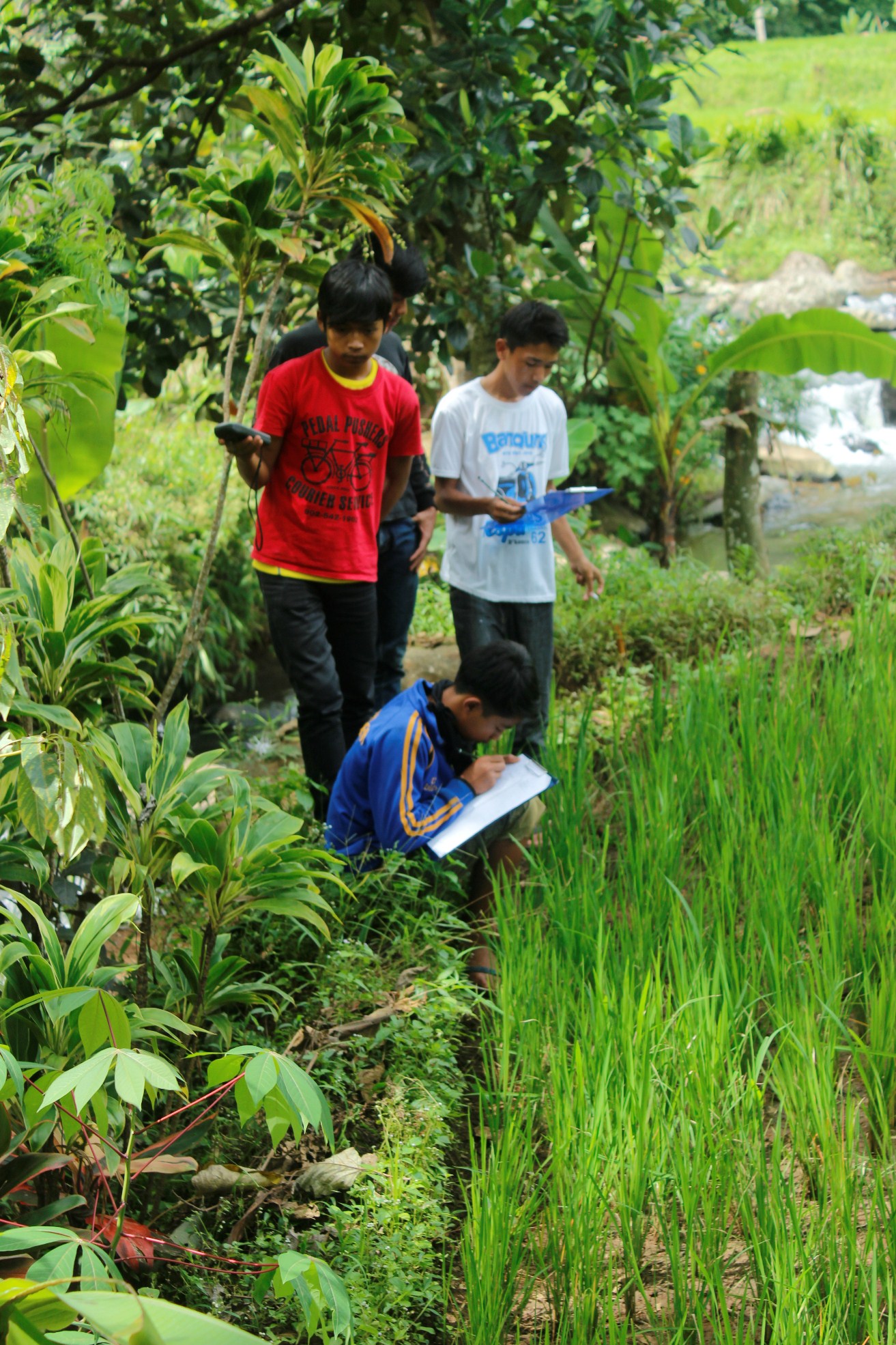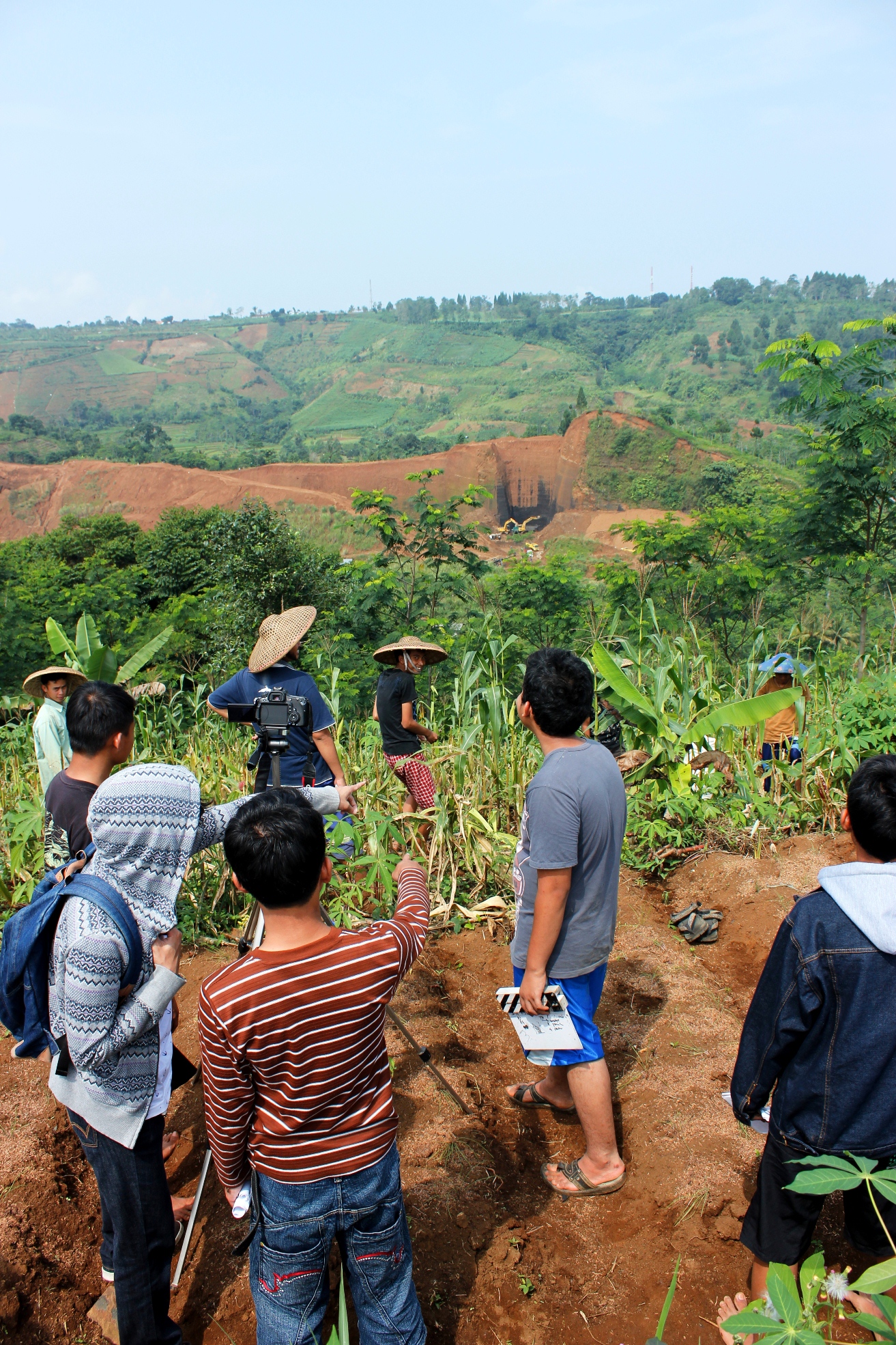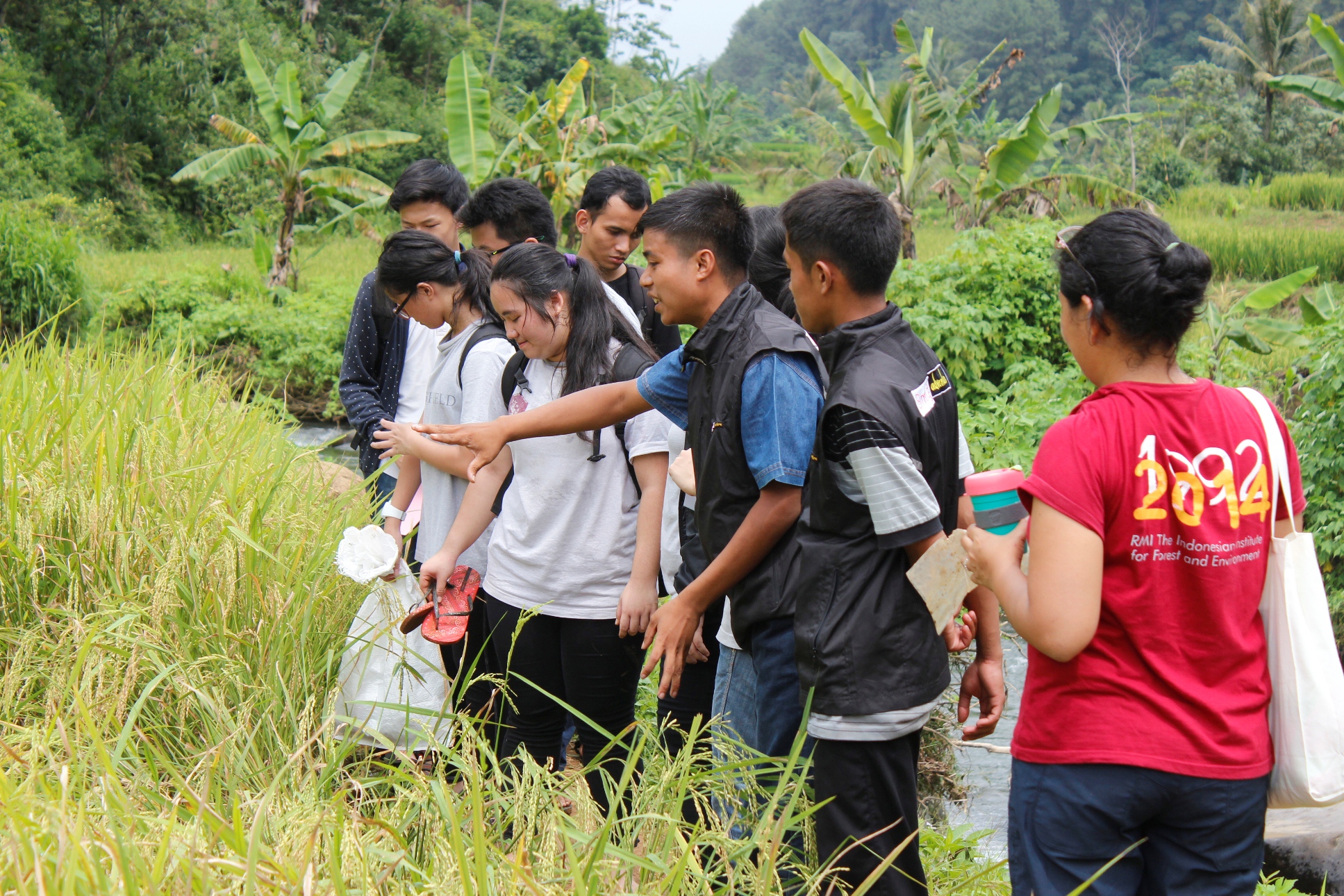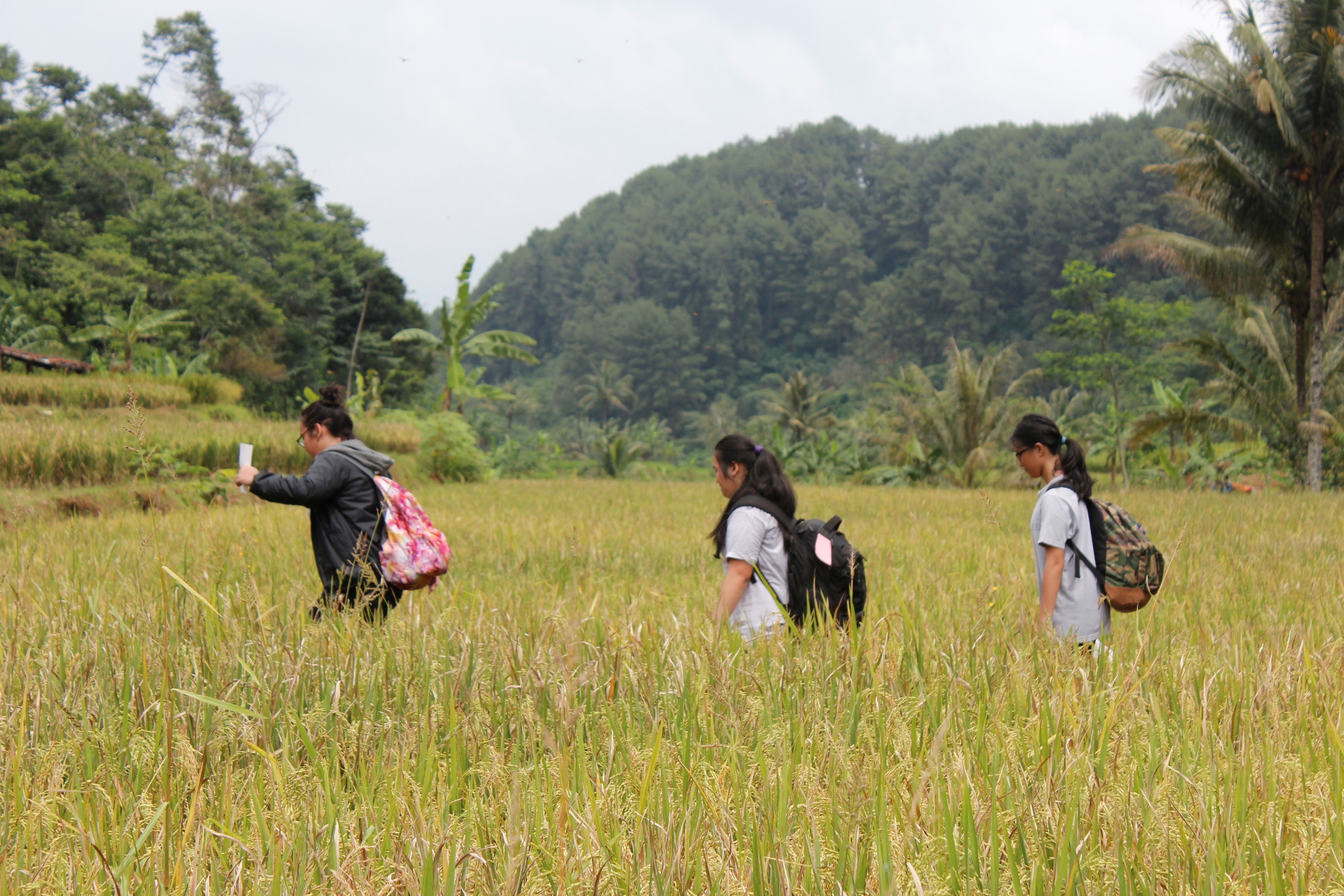Mardha Tillah and Fahmi Rahman
Usep, 24, rolls out of bed to get ready. He is about to facilitate an environmental education program for 23 Jakarta high school students. The program, Rute Pendidikan Lingkungan (Environmental Education Route, REPLING), has been delivered in several regions of Indonesia, and on this occasion is in Cijambe, located in the upstream area of Cisadane River in Bogor district, West Java. Since the land there is put to a variety of uses, Cijambe is an ideal setting for education on rural livelihoods, climate change, conservation issues, and just governance, to name a few of the program’s topics. Usep’s engagement stems from a personal motive: Cijambe is his birthplace.
As a local facilitator, Usep will be taking the students on this program for two reasons. First, to increase their knowledge and awareness of the ecological importance of the upstream area of Cisadane catchment area, which needs protection from degradation. The second reason is much more personal: he is fighting for his hamlet’s existence. The settlement, forest garden, and paddy field areas depend on the river for survival. Keeping the river clean and healthy through community-based ecotourism projects will enhance the villagers’ bargaining position for access to the land, and Usep believes that REPLING will help.
REPLING, developed in Bogor by Rimbawan Muda Indonesia (Young Indonesian Foresters, RMI) in 1992, aims to increase participants’ knowledge and awareness in three areas. First, the connection between environmental quality and human acts. Second, the effect of environmental health on participants’ own wellbeing and welfare. And finally, interdependence between ecosystems.
Ecotourism project
This REPLING event in Cijambe hamlet is part of a wider, youth-led, community-based ecotourism project. The REPLING part of this project is helping young people interpret socio-environmental situations and their economic and political implications. This is achieved through tracking and focus-group discussions combined with fun, interactive learning.
Usep’s involvement began after he dropped out of junior high school due to financial difficulties in 2014, and he and some of his Cijambe friends attended REPLING facilitator training, held by RMI. In 2015 he quit a factory job to make time for more community engagement, and has since been fighting to keep Cijambe hamlet alive amid ongoing mega development projects like the one planned by PT Lido Nirwana Parahyangan (LNP).
A sister company of PT MNC Land, LNP plans to remove the hamlet to develop a six-star luxury resort. MNC Land is owned by Hary Tanoesoedibjo, a vice presidential candidate in the 2014 elections, who is a business partner of Donald Trump, the recently inaugurated president of the United States. Trump Hotels is an investor in the LNP project.
Within 20 years, the company also plans to clear areas in more than 10 other hamlets across three villages in Bogor district, and more than five villages in the nearby Sukabumi district. All of the hamlets are to be replaced by high-end, so-called ‘ecotourism projects’ featuring condominiums, a golf course, and a theme park. This would be the end of the lush forest and agricultural life that the locals have maintained since 1943 – the year the first house was built in the area, deep inside the forest to provide food to the guerrilla army who were hiding in the area during the country’s independence struggle. A local government official once called the project ‘a genocide of the whole sub-district’.
 Local youth help to make a map of their hamlet - Credit: Fahmi Rahman
Local youth help to make a map of their hamlet - Credit: Fahmi Rahman
Usep and his peers want to enhance their hamlet’s bargaining position against the company by developing their own community-based ecotourism project using the REPLING approach. Taking the initiative to establish the reputation of their hamlet as an ecotourism destination on the outskirts of Jakarta will allow them to collaborate with LNP rather than be deemed dispensable for the company’s ecotourism projects.
Usep and his friends are also hoping that building their own capacity to manage ecotourism projects will strengthen their case for their being beneficial for the management of the national park rather than being seen as a ‘threat’ – a label that the National Park Authority has used to describe Cijambe inhabitants for years.
Learning about land conflicts
The community-based ecotourism project was inspired by a number of local tourists visiting a waterfall in Cijambe. Located one and a half hours from Bogor city, the hamlet has a beautiful landscape of paddy fields surrounded by an agroforestry area managed by villagers and a conservation forest area managed by the Gede Pangrango National Park authority. The villagers grow cash crops, such as coffee and cardamom, and the three waterfalls draw many tourists.
Land, however, is something the villagers do not possess any more: 70 per cent has been sold to outsiders, mainly to LNP. The little that they still own is everything to them. Their lands have been gradually sold off since the 1990s when the concession rights of this area were still under the control of President Suharto’s crony and family member Ibnu Sutowo, who had managed a hotel and golf course in the 680-hectare area since the 1980s.
The local youth have learned a lot about land conflicts through the development of Cijambe hamlet as an ecotourism destination. For example, in the process of developing the camping ground as a site for environmental education programs, Usep and his friends learned the true meaning of land dispossession. Since Cijambe’s inhabitants only own 30 per cent of their hamlet’s land, the group could not make use of land belonging to LNP without a permit. However, once they obtained an informal permit, a local preman (thug), who was also an employee of LNP, began taking advantage of them. He demanded an informal tax of Rp.200,000 (A$20) on the program’s Rp.800,000 monthly profit – a huge margin – while threatening to cancel the permit. These experiences gave Usep and his friends a first-hand taste of injustice around land usage.
Knowledge is empowering
At least 30 young people aged 15 to 30 are involved in the project, making up about 10 per cent of the local population. The young people are former and current factory labourers like Usep, school drop-outs, motorbike taxi drivers and peasants.
Most of these youth have been discouraged from learning to effectively manage the hamlet’s natural resources by a combination of factors. The people own only a limited amount of land, which makes it difficult to make a living from it. This is coupled with the insecurity they face in accessing their agroforestry land because it overlaps with the Gede Pangrango National Park’s claim. Finally, there is a lack of support from the government for marketing their agricultural products.
 Rural and urban youth collaborating to produce a documentary movie on land issues - Credit: Fahmi Rahman
Rural and urban youth collaborating to produce a documentary movie on land issues - Credit: Fahmi Rahman
Due to these challenges, younger people usually prefer not to work in connection with land use. Only 10 to 15 per cent of 18 to 30 year olds work in the farming sector, for instance. The lack of involvement in farming and other land-related professions has created a knowledge gap among younger generations in understanding the dire predicament of the hamlet. In addition, they lack the knowledge and skills needed for effectively promoting change.
This is how environmental education functions as the main tool for youth empowerment. It reintroduces them to their surroundings, to the richness of its biodiversity, to the hamlet’s history, and to the meaning of certain cultural practices that are relevant to natural resource management, including the problems they are facing now. It also equips young people with the skills for becoming local facilitators, enabling them to share with visitors their knowledge of the issues faced by their hamlet, and their broader implications.
As part of the REPLING learning process, the hamlet youth were asked to gather information about their local area, for it to be shared with other REPLING participants: high school students from Jakarta. The information gathered includes a history of land ownership, biodiversity richness, a land-use map and a land-ownership map. Collecting information has pushed the youth to talk to local elders and in doing so inherit knowledge that might otherwise have disappeared.
Another REPLING activity involves gathering information on land use and land ownership by conducting participatory mapping activities. The youths used GPS technology to mark points based on community members’ land claims – the coordinates were then discussed among the land owners and land managers, involving the Cijambe youth in the hamlet’s meetings. This way, young people are increasing their understanding of land ownership and land use in their hamlet.
Implementing REPLING
On the morning of the REPLING program with the 23 Jakarta students, Usep talked about these issues. He explained that cardamom plants only grew under certain tree species in the community’s agroforestry garden. He argued that the livelihood of the community should not depend on a single agricultural commodity and that crop diversity had positive ecological impacts. The agroforestry garden, he said, would help to maintain a rich biodiversity and contribute to local ecosystem health, and the survival of the hamlet and its residents.
Investigating the purpose and nature of the area’s paddy fields, waterfalls and river reveals that the agroforestry garden and aquatic biota of one hamlet are deeply interconnected with other ecosystems. It also helps the participants see that local issues are linked to the wider environmental situation and broader socio-political issues in the country. Usep demonstrated how the survival of his particular hamlet would ensure wider ecological health, even for non-rural communities.
The local youth were eager to be a part of these activities and discussions as they realized that their involvement could contribute to resolving latent land-based conflicts. While competing claims to parcels of land have created tension between the villagers and the National Park Authority, REPLING has helped to create new spaces for collaboration and conflict resolution. A tangible outcome has emerged: looking at the youths’ effort to clean up waterfalls as part of their ecotourism program, the Gede Pangrango National Park authority has asked the Cijambe young people to manage all three waterfalls in the area, overseen by the authority. This arrangement is unprecedented and has given Cijambe’s villagers hope that they can further resolve overlapping land claims between themselves and the National Park Authority. Instead of being suspicious of each other, they are now developing a formal collaboration.
Also, the current management of the hotel and golf course, which is to be further developed into a 3000-hectare tourism complex, has now sub-contracted part of their tours to the Cijambe youth when their customers ask for more ‘village experiences’. Although no legal agreement has been signed, there are, on average, 20 hotel guests each month who visit Cijambe hamlet on guided tours facilitated by Cijambe youth.
Attracting urban youth
REPLING has brought about another positive side effect: links between urban and rural youth. It provides opportunities for urban youth to meet Cijambe youth either as REPLING participants or co-facilitators. These links have given the Cijambe community extra support. The urban youth are using their networks to promote Cijambe hamlet’s ecotourism project, and their greater cause, for no charge. Cijambe’s urban REPLING participants have also produced a semi-documentary movie about the hamlet, together with the local people.
 A REPLING facilitation process led by a local youth - Credit: Erik Suhana
A REPLING facilitation process led by a local youth - Credit: Erik Suhana
In return, the urban youth feel that they gain significant knowledge about social and environmental issues from their involvement with the Cijambe project and derive satisfaction from being able to contribute to change. Urban youth reported back positively about their participation in REPLING. Wulan, 22, said: ‘Now I understand what was discussed at university in lessons on agrarian issues. I learned more in a few days during my involvement with the struggle over access to land with the young people in Cijambe than in a whole semester of classes on the same subject at university’.
Melani, 19, a graduate of an international high school in the city, noted that the first time she saw a real rice paddy was in Cijambe. She has been eager to publicise the threats that her new friends are facing and uses Instagram to inform her city-based friends about it. Her friends come from wealthy families who are rarely exposed to these kinds of issues. After participating in REPLING, she offered her expertise in graphic design to contribute to the struggle. Melanie is now the main graphic designer for posters, flyers and other publications that promote Cijambe’s fight for existence.
Another participant, Fatima, 21, works in the finance department of a property development company, and was shocked to learn that companies like that of her employers could become a threat to the lives of people her age. She has applied to conduct a small research project on the evolution of land ownership after the actions of the tourism company in 2013. She resigned from the company in October 2016 to formally join RMI’s team a month later.
Collaboration like this between rural and urban youth in the struggle over access to land is unusual. Generally, neither group has been heavily involved in agrarian movements. The collaboration combines local knowledge with university-based knowledge to create novel approaches to knowledge sharing and production.
A not-so-soft approach
Environmental education has often been considered a soft approach to addressing environmental issues. However, the Cijambe project has shown that attracting a wider audience to the environmental justice movement can produce tangible, hard results for people caught up in land conflicts. It has built support among a wider audience while empowering the Cijambe community. Yet, an important question lingers: will Cijambe be able to fully (and legally) resist LNP’s development project? Whatever the outcome, it is clear that youth, especially in rural areas, should be more frequently consulted as main actors in the struggle over socio-environmental justice. Since REPLING programs are also now being developed in West Sumatra, East Lombok and Banten, these lessons need to be kept in mind.
Usep shared an important final thought: ‘Things are now different to me. I do not see corn or cardamom or rice paddies … merely as a source of income any longer. I have learned that there is knowledge in it. There are historical values in it. There are social values in it. There are values that I was unaware of before this. Removing the land signifies removing all these values – not just losing a source of money.’
Mardha Tillah (tilla@rmibogor.id) has spent eight years developing community organising activities using the environmental education approach at Rimbawan Muda Indonesia (RMI).
Fahmi Rahman(fahmi@rmibogor.id) has been the main community organiser of youth in Cijambe hamlet since 2014.
The project of rural youth empowerment through environmental education has been made possible with support from Terre des Hommes Germany since 2009. Names of the hamlet and individuals have been changed in this article.
